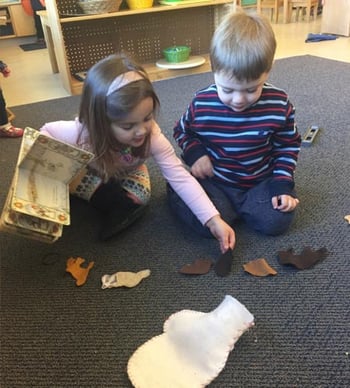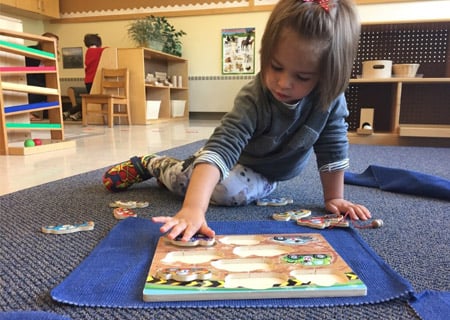 As an adult, Albert Einstein remembered a pivotal event in his life that inspired his interest in scientific discovery. He was four or five years old and stuck in bed with a childhood illness when his father handed him a magnetic pocket compass to play with. He spend hour twisting the compass, wondering how the needle always knew to point towards the north.
As an adult, Albert Einstein remembered a pivotal event in his life that inspired his interest in scientific discovery. He was four or five years old and stuck in bed with a childhood illness when his father handed him a magnetic pocket compass to play with. He spend hour twisting the compass, wondering how the needle always knew to point towards the north.
The book Internet Invention: From Literacy to Electracy, quotes Albert Einstein on how playing with that compass inspired his love of science. "I can still remember," he wrote, "that this experience made a deep and lasting impression on me. Something deeply hidden had to be behind things."
As a parent, you probably love to see your child playing. It’s incredible to hear their ideas and to learn about the new worlds they create. It’s also fun to see how creative they can be as they put their imagination to use in learning about the world around them.
Play is far more powerful for children, however, than many parents realize. It’s actually the key to learning. Researchers and educators across the world have found that play can help enrich learning and develop key skills such as inquiry, expression, experimentation, and teamwork.
What is Meaningful Play?
Schools that use the Montessori education focus on encouraging children to learn through “meaningful play.” According to the book, From Play to Practice: Connecting Teachers' Play to Children's Learning, “meaningful play” has five characteristics. It:
- Gives the child a choice about what he or she wants to do
- Feels fun and enjoyable for the child
- Evolves spontaneously, rather than giving kids a script to follow
- Is driven by intrinsic motivation about what the child wants to do
- Creates a risk-free environment where kids can experiment and try new ideas.
In meaningful play, children are active participants. For example, instead of passively taking in a lesson, children take on roles alongside their peers and respond to the other children according to the rules of play that they’ve created.
While “rules” may seem counterintuitive to the idea of free, voluntary play, a system of mental rules is actually one of the other key features of play. Children may state these explicitly, form them collaboratively or follow a selected leader, or have an inherent sense of what governs the terms of their playful engagement. This active, pleasurable negotiation of rules and symbols can offer a number of learning benefits.
How Do Children Learn Through Play?
In her TedX Talk, Professor Doris Fromberg, Director of Early Childhood Teacher Education at Hofstra University, explains why play is such an important part of the learning process for children.
We need to consider that young children learn in quite different ways [than adults]. They learn by comparing physical experiences, by interactions with other people and their own feelings. And they learn an enormous amount through their imagination.... Play is what pulls together the logical and creative parts of the brain.
 For young children, play is often a full body activity that helps them develop skills they will need later in life. Running, dancing, climbing, rolling—these activities all foster muscle development and help fine-tune motor skills. Children also build their mental and emotional muscles as they create elaborate, imaginative worlds rich with a system of rules that govern the terms of play.
For young children, play is often a full body activity that helps them develop skills they will need later in life. Running, dancing, climbing, rolling—these activities all foster muscle development and help fine-tune motor skills. Children also build their mental and emotional muscles as they create elaborate, imaginative worlds rich with a system of rules that govern the terms of play.
University of Denver researchers Elena Bodrova, Carrie Germeroth, and Deborah J. Leong found that children teach themselves to regulate their emotions and think before they act when they play. For example, if a child is pretending to be Olaf from Frozen, they may pretend they’re melting when they come inside or insist that they like warm hugs. In each case, they consider how their actions will correlate with how Olaf should act in a given situation.
This role playing helps children build social skills and helps them become the kind of adults who are able to thrive in a range of personal and professional environments.
Why It’s Important to Include Play in the Classroom
In an academic setting, play can also help children learn and grow. Teacher-initiated play is a close cousin to inquiry based learning. At Whitby, our early child educators ask children questions about the rules and process that govern the play, and then encourage children to make connections to the wider world through their own body of knowledge.
Dr. Angeline S. Lillard, author of Montessori: The Science behind the Genius, wrote about about how Maria Montessori encouraged educators to use play as a part of the learning process.
[In a Montessori classroom] teachers guide learning within structures but do so playfully and loosely, with particular focus on the goals they have in mind... the Montessori education resembles playful learning.
We’ve seen this at Whitby. When we take a play-based approach to combining different subjects, we’ve found that teachers can create an educational experience greater than the sum of its parts. Students learn critical thinking skills, develop their language abilities, expand their range of knowledge and increase their social emotional awareness—all without realizing how much they’re learning.
Maximize Learning Through Play
From offering children a chance to ask questions, problem solve, work collaboratively and conduct structured experimentation, play is a key component of learning at Whitby. One way that Whitby teachers bring a sense of play into the classroom is by taking an activity-based approach to nearly every subject.
For example, when our teachers read a book aloud, they encourage young students to turn each page and follow each word with their fingers. They can also prompt students to talk to each other about the content, and to talk about the associations it sparks from their own lives. Teachers also engage kids’ imaginations and sense of curiosity by asking “What do you think will happen next?”
Students are also given an opportunity to bring stories to life through dramatic play. When children are given opportunities to act out scenes and express themselves, they improve their social confidence, increase their ability to see the perspectives of others and increase the attention they give to the literature.
Play gives children a chance to practice what they’re learning.
- Fred Rogers
At Whitby, we seek to teach children that learning is not just a formal activity they do in the classroom—it’s actually a lot of fun! One of our goals is to give kids opportunities to wonder, question, work as a team, experiment, play with different possibilities and investigate subjects that interest them. For example, in our 3D printing class, educators give students the opportunity to design an object from their imagination. Then they ask students to explain, “Why did you make that?” “What did you make it out of? What is the purpose of that object?”
This teacher engagement supports children in their creativity, while also challenging them to think about why they chose to create an object. It also requires them to think through the challenges they solved in creating it and helps them become more confident in their problem solving abilities.
Help Your Child Learn Through Play
Our goal at Whitby is to help students learn to ask questions, express themselves, collaborate with others, and take creative risks. We also want them to retain their natural curiosity and to never lose the excitement of learning something new. All those things are achieved by making learning fun for children.

